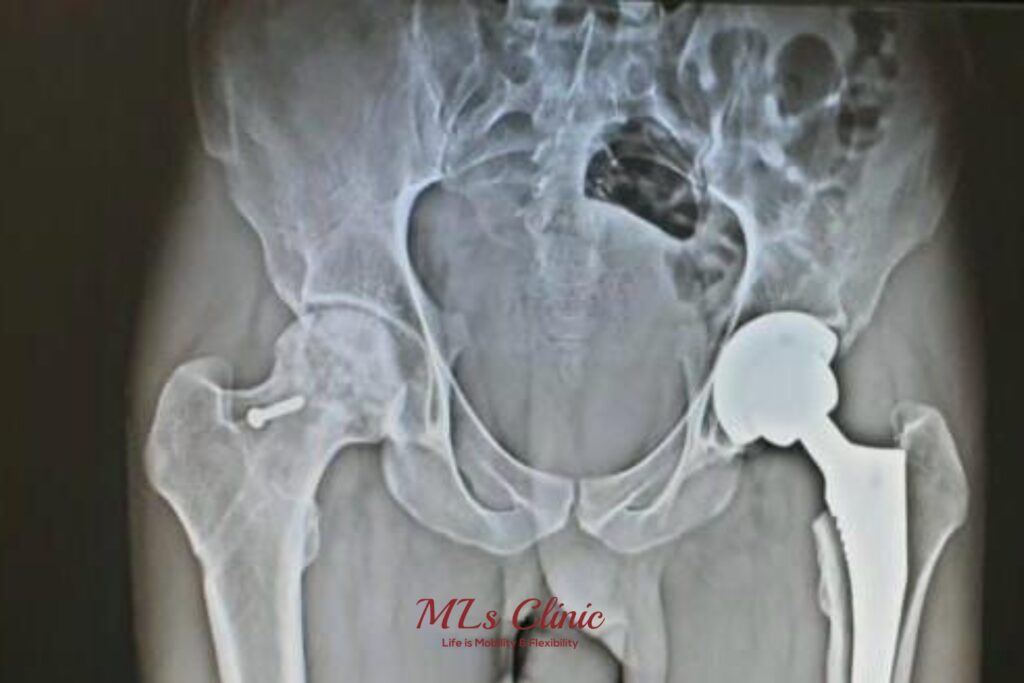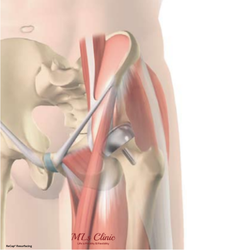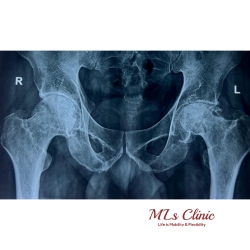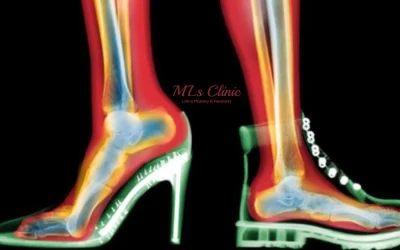Pros and Cons of Hip Replacement: A Complete Breakdown

Before discussing the pros and cons of hip replacement, let’s first talk about the surgery itself. Hip Replacement Surgery is performed while the patient is under anesthesia, which may vary based on individual needs and the anesthetist’s recommendations. Once the patient is asleep, the surgeon makes an incision on the side of the hip and removes the top part of the thigh bone (femur) from its socket. This is then replaced with an artificial ball-and-socket joint. The surgery usually lasts less than two hours.
Regardless of whether it’s a routine or emergency procedure, the goal is the same to replace the damaged hip with an artificial joint.
In this blog post, you’ll hear from Dr. Preetesh Choudhary, an orthopedic surgeon at MLs Clinic, who is board-certified and has special training in knee, shoulder and hip replacement surgery.
If you need joint surgery to fix your hip pain, you might be looking into the pros and cons of hip replacement surgery to help you decide. Dr. Preetesh Choudhary discusses the advantages and disadvantages of hip replacement to help patients make a better-informed choice.
What are the Types of Hip Replacement Surgery?
1. Total Hip Replacement
In this surgery, the hip joint is removed and replaced with an artificial hip implant. It can be done as a total replacement or a partial replacement. While it may sound complicated, hip replacement is actually one of the most common orthopedic surgeries.
2. Partial Hip Replacement
Partial Hip Replacement (PHR), also called hemiarthroplasty, involves replacing only the femoral head (the ball of the hip joint), leaving the natural socket (acetabulum) intact. This procedure is typically used in cases of hip fractures, particularly in elderly patients with osteoporosis, where only the femoral head is damaged. Unlike total hip replacement, PHR does not address issues within the socket, so it is not suitable for patients with arthritis or significant joint degeneration. It is less invasive than total hip replacement, resulting in shorter recovery times, and is generally performed when the socket is still in good condition. The surgery is aimed at restoring mobility and reducing pain, making it ideal for individuals who need quick recovery and are less active. However, the procedure may not provide as long-lasting results as a total hip replacement, and revision surgeries might be necessary if further joint damage occurs over time.
3. Hip Resurfacing
Hip resurfacing is a bone-conserving alternative to total hip replacement, where the femoral head is not entirely removed but reshaped and capped with a metal prosthesis. The socket is also replaced with a metal component, similar to total hip replacement. This procedure is recommended for younger, more active patients who have strong bone density but suffer from hip joint damage due to conditions like arthritis or avascular necrosis. Hip resurfacing preserves more of the patient’s natural bone structure, allowing for greater range of motion and higher activity levels after recovery. It also makes future revision surgeries easier since less bone is removed. However, metal-on-metal wear from the resurfaced joint can lead to complications such as inflammation or metal ion buildup in the body, which has caused a decline in its popularity. Despite these risks, it remains a viable option for selected candidates seeking to maintain an active lifestyle.
but suffer from hip joint damage due to conditions like arthritis or avascular necrosis. Hip resurfacing preserves more of the patient’s natural bone structure, allowing for greater range of motion and higher activity levels after recovery. It also makes future revision surgeries easier since less bone is removed. However, metal-on-metal wear from the resurfaced joint can lead to complications such as inflammation or metal ion buildup in the body, which has caused a decline in its popularity. Despite these risks, it remains a viable option for selected candidates seeking to maintain an active lifestyle.
What are the Pros and Cons of Hip Replacement?
Pros of Hip Replacement Surgery
1. Relief from Pain and Increased Mobility
The biggest benefit of hip replacement surgery is pain relief. Hip arthritis can cause severe pain and restrict your movement, making everyday tasks like walking and climbing stairs difficult. After a successful surgery, many patients feel immediate relief from pain, allowing them to return to their daily activities without the discomfort and stiffness that had been limiting them.
A recent study found that 90% of patients who had moderate pain before surgery reported only mild or no pain after five years.
Furthermore, hip replacement surgery enhances mobility, enabling patients to perform tasks that were once difficult without needing walking aids.
2. High Success Rate
Overall, Total Hip Replacement Surgery is considered one of the most successful surgeries available. For the right patient, it can be an effective, safe, and long-lasting solution for many issues related to severe hip arthritis.
3. Strong Success Rate
Overall, Total Hip Replacement Surgery is considered one of the most successful surgeries available. For the right patient, it can be an effective, safe, and long-lasting solution for many issues related to severe hip arthritis.
4. Enduring Benefits
Hip Replacement Surgery offers a long-lasting solution for issues related to severe hip arthritis. Current research indicates that 80-85% of hip replacements are still functioning well 20 years after the surgery.
5. Enhanced Hip Function
Dr. Preetesh Choudhary, who is the best hip replacement surgeon, says, “After total hip replacement surgery, you’ll be able to walk and participate in activities without restrictions. Tasks that were difficult before, like putting on shoes and socks, getting up from a chair, and climbing stairs, become much easier.
Cons of Hip Replacement Surgery
-
An artificial hip isn’t as good as a natural hip.
It has some limitations. For example, certain positions like crouching can be risky because they might dislocate the hip joint. Choosing Hip replacement surgeon in Indore, who is experienced in total joint replacements will help minimize any discomfort.
-
Change in Leg Length
Sometimes, after a total hip replacement, one leg may feel longer or shorter than the other. Although your orthopedic surgeon will try to keep the leg lengths equal, small differences can happen to ensure the hip is stable, which is the surgeon’s top priority.
Hip Replacement Surgery at MLs Clinic
Total Joint Replacement surgeon at MLs Clinic has 18+ years of experience in managing and treating joint issues caused by degenerative diseases like arthritis, fractures or joint injuries.
If you’d like to learn more about Total Hip Replacement at MLs Clinic, please schedule an appointment by calling (+91) 95840 7710.







